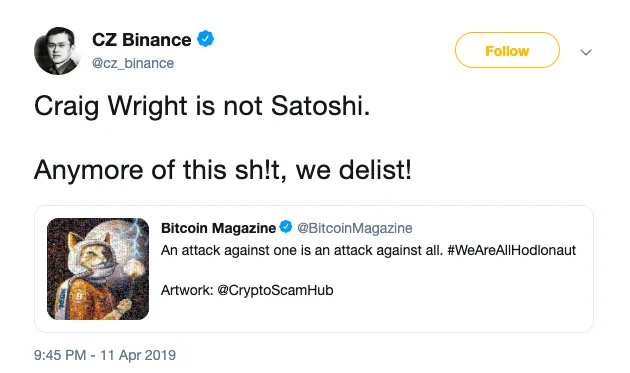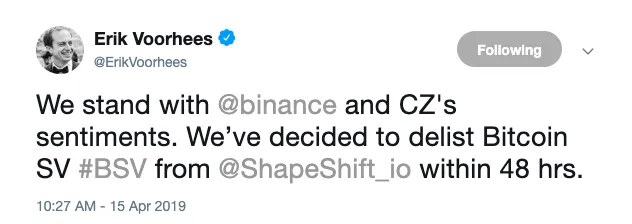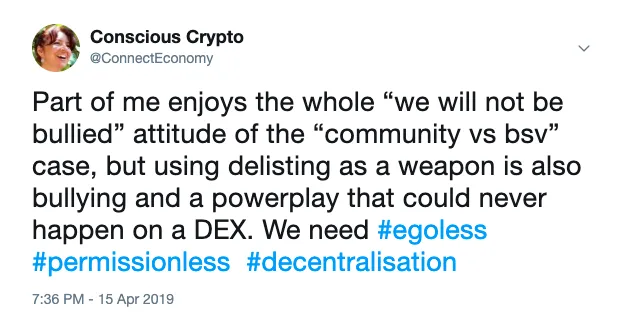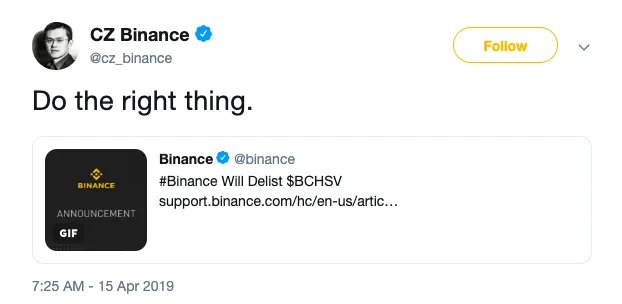Over the past couple of weeks, we've witnessed quite some drama on Twitter in regards to Bitcoin SV. There was a bit of a war between Craig Wright - who decided to sue anyone who says that he is NOT Satoshi Nakamoto - and the crypto community. Well, a large part of it, including some exchanges.
It started with Twitter user hodlonaut deleting their account, after receiving a letter from Craig Wright's lawyer.
Here is a quick run down of events, if you're interested.

It was great to see the community coming together, standing up for what they believe in, and unitedly supporting hodlonaut. Many people changed their profile pictures to a "space cat", and lots of merchandise was created and sold, with the proceeds going to hodlonaut's potential legal costs to fight Craig Wright.
And of course, for any cause or movement, it's great when some powerful voices with a large platform and the ability to actually affect change - back you up and join your cause.
That's what happened when CZ, CEO of Binance, tweeted that if Craig Wright wouldn't stop, Binance would delist Bitcoin Cash SV:

This took things to a new level, because other exchanges, like Shapeshift and Kraken followed Binance's example.

On one hand, this shows solidarity and I think it's important to stand up and be vocal for what you believe in.
However...
As an exchange, do you have a responsibility to the market, or are you just a private service provider with your own agenda?
I'm a bit torn on this.
I see exchanges as third party services providers, that serve the community and the market.
If a coin loses its value because the community loses trust in its creator, that's one thing. It's the people's choice to trust in a human being or in code and buy or sell accordingly.
But the actions of an exchange - the support or non-support of a crypto asset - actively influence the price of that asset.
Is that really a good thing? Or is that an abuse of power? The very same power that the crypto movement wants to liberate the world from?
BSV lost about 40% in value since the delisting announcements started.

Looking at the whole crypto space, this could also be viewed as decentralisation in action, though.
Every exchange can do whatever they want. There is no central authority that rules the crypto space as a whole, and tells the exchanges what to do.
So, some of them deciding to delist, and others not, could also be viewed as decentralisation and the market sorting itself out - without any one person or authority enforcing a decision on everyone.
It's all a matter of perspective.
Still, I hope we will see more and more decentralised exchanges soon.
Binance is actually actively moving in that direction. When that happens, CZ will still have his powerful influencer voice, but he won't be able to actually remove a coin from a decentralized exchange.

What do you think is the right thing?
This article was previously published on Publish0x.
About the author:
Anja Schuetz helps absolute beginners to become confident crypto investors. She also consults as a Customer Communication & Operations Manager for blockchain start-ups.
Anja offers a Free Bitcoin Beginner's Course when you sign up to her Conscious Crypto Museletter here: http://anjaschuetz.net and has also written a Beginner's Guide to Steemit
